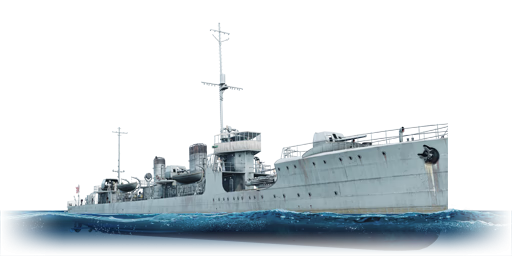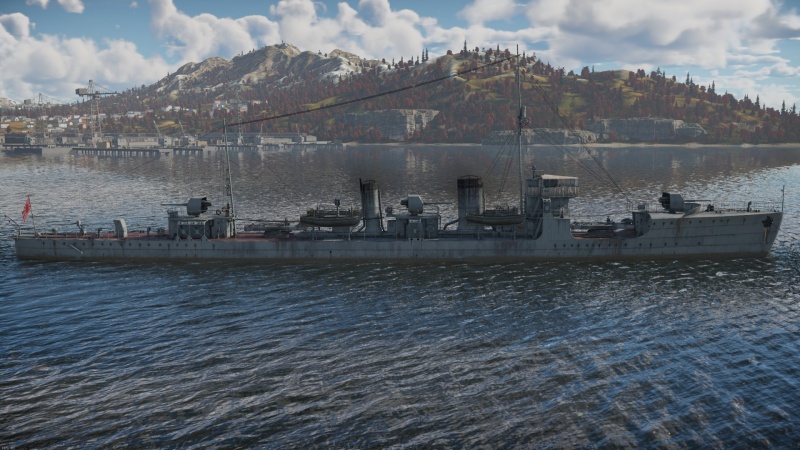IJN Momi
Contents
Description
The Japanese destroyer Momi (樅, namesake: Japanese fir tree) was the lead ship of her class, notable for being the first Japanese destroyers armed with 533 mm torpedo tubes. Constructed at the Yokosuka Naval Arsenal as part of the 1918 Programme, she was launched in June 1919 and commissioned in December 1919. Momi's career was uneventful and she was stricken from the Navy List in April 1932, serving as an experimental hulk at Yokosuka until 1936 before being broken up at a later date.
The Momi class, IJN Momi, 1930 is a Japanese destroyer introduced in Update "Sons of Attila". She is notable for a very good primary armament and excellent torpedoes, though at the expense of below-average survivability, despite her armour over the engine spaces. She is best played in a highly aggressive manner, ambushing enemy vessels and dictating engagements thanks to her good mobility. Her main guns are of a calibre high enough to either cripple or outright destroy most motor torpedo boats with a single HE shell hit. However, she struggles to respond to aerial attacks, as her two 7.7 mm machine guns are grossly inadequate, even against the weakest biplanes.
General info
Survivability and armour
Talk about the vehicle's armour. Note the most well-defended and most vulnerable zones, e.g. the ammo magazine. Evaluate the composition of components and assemblies responsible for movement and manoeuvrability. Evaluate the survivability of the primary and secondary armaments separately. Don't forget to mention the size of the crew, which plays an important role in fleet mechanics. Save tips on preserving survivability for the "Usage in battles" section. If necessary, use a graphical template to show the most well-protected or most vulnerable points in the armour.
Mobility
Write about the ship's mobility. Evaluate its power and manoeuvrability, rudder rerouting speed, stopping speed at full tilt, with its maximum forward and reverse speed.
| Mobility Characteristics | |||
|---|---|---|---|
| Game Mode | Upgrade Status | Maximum Speed (km/h) | |
| Forward | Reverse | ||
| AB | |||
| Upgraded | 82 | 22 | |
| RB/SB | |||
| Upgraded | 67 | 18 | |
Modifications and economy
Armament
Primary armament
Provide information about the characteristics of the primary armament. Evaluate their efficacy in battle based on their reload speed, ballistics and the capacity of their shells. Add a link to the main article about the weapon: {{main|Weapon name (calibre)}}. Broadly describe the ammunition available for the primary armament, and provide recommendations on how to use it and which ammunition to choose.
| Penetration statistics | |||||||
|---|---|---|---|---|---|---|---|
| Ammunition | Type of warhead |
Penetration @ 0° Angle of Attack (mm) | |||||
| 1,000 m | 2,500 m | 5,000 m | 7,500 m | 10,000 m | 15,000 m | ||
| 120 mm Type 1 HE | HE | 24 | 24 | 24 | 24 | 24 | 24 |
| 120 mm Type 1 SAP | SAP | 114 | 89 | 59 | 40 | 30 | 26 |
| 120 mm Type 0 HE | HE-TF | 24 | 24 | 24 | 24 | 24 | 24 |
| Shell details | ||||||||||||
|---|---|---|---|---|---|---|---|---|---|---|---|---|
| Ammunition | Type of warhead |
Velocity (m/s) |
Projectile mass (kg) |
Fuse delay (s) |
Fuse sensitivity (mm) |
Explosive mass (TNT equivalent) (kg) |
Ricochet | |||||
| 0% | 50% | 100% | ||||||||||
| 120 mm Type 1 HE | HE | 850 | 20.33 | 0 | 0.1 | 1.95 | 79° | 80° | 81° | |||
| 120 mm Type 1 SAP | SAP | 850 | 20.4 | 0.015 | 5 | 1.87 | 47° | 60° | 65° | |||
| 120 mm Type 0 HE | HE-TF | 850 | 20.33 | 0 | 0.1 | 1.95 | 79° | 80° | 81° | |||
Secondary armament
Some ships are fitted with weapons of various calibres. Secondary armaments are defined as weapons chosen with the control Select secondary weapon. Evaluate the secondary armaments and give advice on how to use them. Describe the ammunition available for the secondary armament. Provide recommendations on how to use them and which ammunition to choose. Remember that any anti-air armament, even heavy calibre weapons, belong in the next section. If there is no secondary armament, remove this section.
- Universal: AP · T · AP · T · AP · T · AP · T
- 7.7 mm AP belt: AP · AP · AP · T · AP · AP · AP · T
- 7.7 mm API belt: IT · IT · IT · AP · IT · IT · IT · AP
| Penetration statistics | |||||||
|---|---|---|---|---|---|---|---|
| Ammunition | Penetration @ 0° Angle of Attack (mm) | ||||||
| 10 m | 100 m | 500 m | 1,000 m | 1,500 m | 2,000 m | ||
| AP | 9 | 8 | 7 | 5 | 4 | 3 | |
| T | 8 | 7 | 6 | 4 | 3 | 2 | |
| IT | 8 | 7 | 5 | 4 | 3 | 2 | |
| Shell details | ||||||||||||
|---|---|---|---|---|---|---|---|---|---|---|---|---|
| Ammunition | Velocity (m/s) |
Projectile mass (kg) |
Fuse delay (m) |
Fuse sensitivity (mm) |
Explosive mass (TNT equivalent) (g) |
Ricochet | ||||||
| 0% | 50% | 100% | ||||||||||
| AP | 780 | 0.01 | - | - | - | 47° | 56° | 65° | ||||
| T | 780 | 0.01 | - | - | - | 47° | 56° | 65° | ||||
| IT | 780 | 0.01 | - | - | - | 47° | 56° | 65° | ||||
Additional armament
The Type 6 torpedoes feature a combination of excellent speed and range, while still carrying a relatively good warhead. It's best to keep the Torpedo Modification uninstalled, as it decreases the speed by 17 km/h to extend the range far beyond what is useful on maps within this BR range. The torpedo tubes lack some forward firing angle, trading it for a wider arc to the aft of the vessel, which can be utilised with tight turns to leave a “goodbye gift” for any enemy you are attempting to disengage from.
Usage in battles
Describe the technique of using this ship, the characteristics of her use in a team and tips on strategy. Abstain from writing an entire guide – don't try to provide a single point of view, but give the reader food for thought. Talk about the most dangerous opponents for this vehicle and provide recommendations on fighting them. If necessary, note the specifics of playing with this vehicle in various modes (AB, RB, SB).
Pros and cons
Pros:
- Very good damage output
- 4 highly capable torpedoes
- Above-average mobility
- One of the lowest-BR destroyers with armour on parts of the hull
- Shell rooms located deep below the waterline
Cons:
- Extremely poor secondary armament, with just two 7.7 mm guns on the sides of the bridge
- While her armour can stop HE shells, it is ineffective against anything else, including AP belts from autocannons or heavy machine guns
- Aft gun cannot rotate 360°
- Low guidance speed of the main guns
History
The Japanese destroyer Momi was the lead ship of her class of 21 second-class destroyers built for the Imperial Japanese Navy in three distinct sub-classes (8 Momi-sublcass, 5 Fuji-subclass and 8 Ashi-subclass) as the first Japanese destroyers armed with the 533 mm torpedo tubes. Constructed at the Yokosuka Naval Arsenal as a part of the 1918 Programme, she was laid down on 23 January 1918, launched on 10 June 1919, and commissioned on 27 December 1919.
Very little is known of 13 years of her career until she was stricken from the Navy List on 1 April 1932 and renamed Disposal Destroyer No.2 (廃駆二号, Haiku 2-Gō). She served as an experimental hulk at Yokosuka, used for trials until 1936, before being broken up at an unknown date.
During World War Two, there were two destroyers named Momi (樅), one of the Momi class, launched on 10 June 1919, and another of the Matsu class, launched on 16 June 1944. The Momi-class Momi was scrapped, while the Matsu-class Momi was sunk by torpedo bombers from US Task Force 77. Additionally, there was a Momo class (桃) with a similar Latin transliteration and the lead ship, Momo herself, launched on 12 October 1916. Interestingly, unlike the other two, the Momi class does not appear in the interwar Jane's Fighting Ships, which at the time was the primary source book for the publicly available information about the fleets of various nations around the globe.
Media
Excellent additions to the article would be video guides, screenshots from the game, and photos.
See also
External links
- [Wikipedia] Momi-class destroyer
- [Wikipedia] Japanese destroyer Momi (1919)
- [The Pacific War Online Encyclopedia] Momi Class, Japanese Destroyers
- [Navypedia] MOMI destroyers (1919 - 1923)
- [Combined Fleet] MOMI-Class Destroyers in World War II
- Warships of the Imperial Japanese Navy, 1869-1945 by Hansgeorg Jentschura, Dieter Jung and Peter Mickel
| Yokosuka Naval Arsenal (横須賀海軍工廠) | |
|---|---|
| Destroyers (DD) | |
| Momi-class | IJN Momi |
| Light Cruisers (CL) | |
| Mogami-class | IJN Suzuya |
| Heavy Cruisers (CA) | |
| Myōkō-class | IJN Myoko |
| Battlecruisers (BC) | |
| Kurama-class | IJN Kurama |
| Amagi-class | IJN Amagi |
| Battleships (BB) | |
| Fusō-class | IJN Yamashiro |
| Nagato-class | IJN Mutsu |
| Tanks | Ka-Mi · Ka-Chi · Chi-Ha LG |
| See also | Yokosuka Naval Air Technical Arsenal |
| Japan destroyers | |
|---|---|
| IJN | |
| Momi-class | IJN Momi |
| Mutsuki-class | IJN Mutsuki · IJN Satsuki |
| Fubuki-class | IJN Ayanami |
| Hatsuharu-class | IJN Hatsuharu · IJN Nenohi |
| Shiratsuyu-class | IJN Yuudachi |
| Yugumo-class | IJN Yugumo · IJN Hayanami · IJN Kiyoshimo |
| Shimakaze-class | IJN Shimakaze |
| Akizuki-class | IJN Akizuki · IJN Hatsuzuki |
| JMSDF | |
| Ariake-class* | JDS Yūgure (DD-184) |
| Harukaze-class | JDS Harukaze (DD-101) |
| Murasame-class | JDS Murasame (DD-107) |
| * Modified Fletcher-class destroyers | |





